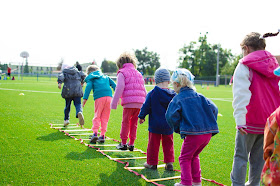As an expat parent with multiple
kids, I can tell you right now that raising more than one is difficult, to say
the least. With my two kids, it requires continuous learning and adjustment.
Most days are amazing but some days are just chaotic. Things are even more
complicated since I have an elementary student and a toddler.
 |
| New Parent's Quick Guide To Raise Multiple Children |
In this article, I will share with
you some of the things I have discovered when raising multiple kids in
different age groups. These general tips should help you as well regardless if
you’re a single parent or a stay-at-home mom or dad.
Stay flexible and don’ expect it
to be perfect.
For many parents, parenting, in general, can feel like survival
than full bliss. Kids and babies are unpredictable, so it’s vital to understand
that being flexible is vital, especially as your family grows. Understand that
plans can change and may go wrong, and you might not see that you become the
parent you’ve always wanted to be.
All of these are normal and to be
expected.
Try to embrace the chaos and just know that parenting isn’t meant to
be perfect – it’s a challenge, a struggle, and fulfilling all at the same time.
Teach understanding and empathy.
It’s crucial to teach older kids the value of understanding, patience, and
empathy when parenting children in different age groups. Involve them in
activities that they don’t find amusing, or try keeping certain things away
from the younger ones.
When they show unhappiness in
particular situations, explain to them that this is what others did for them
during their younger years— that raising a child takes patience and sacrifice
from the entire family. Kids are more adaptive and sensitive than we think.
Modeling understanding, patience, and empathy for them will instill the same
attributes to them in the future.
Set aside one-on-one time.
It’s
also vital to spend quality one-on-one time with each child aside from doing
things together as a family. While this is easier said than done, it’s still so
important that each child feels loved so they carry enough to give back to
others.
Whether you’re going to the
movies, baking cookies, or attending a playdate, good one-on-one time will
remind them that they’re valuable to you and loved.
Instill core family values
Another important part of any
successful parenting is instilling core values to the kids. Every child holds a
place in the family. It’s crucial to praise acknowledge their role, whether
it’s as the oldest, middle, or youngest child.
Every child possesses unique
strengths and weaknesses, and as parents it is our duty to respect their
differences while acknowledging values such as kindness, respect, and empathy.
Train yourself about different
stages.
It’s also important to educate yourself about the different stages of
babies and kids. Since I have two kids, I have become knowledgeable about my
baby’s milestones and development, but I’m still at a loss when they become
tweens.
But that’s a journey I’m willing
and even excited to make. What currently worked for my kids when they were
in preschool is that I enrolled them to an International school with a PYP
Campaign. The IB PYP framework focuses on the enrichment and development of every
child as an inquirer, both within the school and beyond. I can start to see
their maturity and inquisitiveness develop.
Understand that what worked with
your kids when they were in preschool might not work when they’re in kindergarten
— the same way discipline methods that worked during the elementary years might
not work when the kids reach junior high.
It’s crucial to keep yourself
updated on the latest research regarding child development or different
parenting tools. Being a successful parent means you must continue learning,
improving, and finding new ways to succeed.
There you have it! If you’re keen
on learning about the PYP CAMPAIGN, you can check out the nearest international
school in your area that offers this program. In quick words, PYP is for
children aged 5 - 12 (Grade 1-5) for the development of a caring and active
participants in a lifelong journey of learning.
If focuses on inquiry-led,
transdisciplinary framework while challenging students to think outside the box
and take responsibility for their own learning as they continuously explore
local and global issues as well as opportunities in real-life contexts.
Lastly, parenting isn’t the
destination, but a journey. Take every day as a gift, be flexible, and remember
that it won’t be perfect – and they won’t be young and cute forever – cherish
the time you have with them, I know I will.

No comments:
Post a Comment
Please Leave a Comment to show some Love ~ Thanks